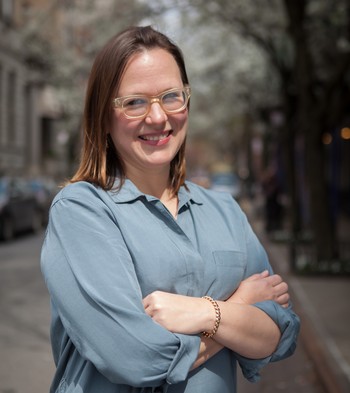Redefining where and when church happens
 I’m a pastor . . . sort of
I’m a pastor . . . sort of
What a changing church could learn from those who serve beyond the walls of traditional ministry
by Mieke Vandersall
When I was first ordained, I hadn’t thought much about how I would spend Christmas and Holy Week. For years I had dreamt of celebrating these holidays with the congregation I was called to serve. I assumed I would be working long hours and that I would do it with more joy than I could imagine.
As I began looking for a call, however, it became clear that I would not be ordained into a traditional ministry setting; I was an out lesbian, and at that point no other out people were ordained into congregational ministry. Instead I found a call to a validated position (that’s Presby speak for an approved ministry beyond the jurisdiction of the church) working for LGBTQ Presbyterians.
My first Advent and Christmas came and went. and then Holy Week . . . and I was sad.
I was doing ministry, powerful ministry at that. I was officiating the sacraments. I was preaching. But as these giant Christian holidays came and went, I felt like I simply wasn’t as much of a pastor as other pastors—I was just kind of a pastor.
When people asked me what I did, I would say that I was a pastor-ish. Meaning: more or less . . . kind of . . . it’s complicated.
I learned to create my own routines and rituals. For Palm Sunday, I was invited to play my violin at a friend’s evening service. For Good Friday, I was invited to preach at a congregation whose pastor wasn’t interested in organizing a Good Friday service. Maundy Thursday was filled in with a different congregation each year. I made it my habit to visit a different Easter vigil service each year, avoiding Easter Sunday. Easter Sunday was a day for me to cook for all my church friends who were working much harder than I was.
‘What has stayed the same, although not as strong as before, is the persistent feeling that I am not as much of a real pastor as others.’
Even though I have left that original call and now work even further outside the traditional structures of the church, my traditions continue. What has changed is that now I have no desire to serve a traditional parish. What has stayed the same, although not as strong as before, is the persistent feeling that I am not as much of a real pastor as others. Perhaps it is my own insecurity. But perhaps it relates to this unspoken understanding I have encountered in the church in my decade-plus years of ordained ministry—the assumption that the primary encounter of ministry, and ordained pastoral ministry in particular, happens in a congregational context.
There are so many others like me who are not in traditional ministries. Call us tent makers, or bi or tri-vocational, or entrepreneurs. Some of us are in these positions by choice. Others are here because there aren’t enough full-time parish jobs or because it is hard to get these jobs if we fall outside most congregations’ comfort zone because of our race, gender, or sexuality (or all of these things). There are so many teaching elders (Presby speak for pastors) serving the church—and God—in many different ways, and I am not the only one who has struggled with feeling like a “real pastor.” We are college and hospital chaplains, professors, writers, nonprofit and social workers, activists, and more, who also often double as waiters, retail workers, cashiers, and more.
As we teach, serve, and listen, we are out there in the world as an entry point for so many into the face of God. We don’t all go to an office in a church everyday. We don’t get to baptize nearly as much as we would like. We wonder a bit what to do with ourselves for the month of December and the week before Easter. Some years we like that more than others. We do pray with and for others. We do thoughtfully proclaim the Word of God through the written and spoken word—just not always through what most consider preaching. We do sit with the dying and counsel the living to use their very own God-given voices. We do encourage others in their faith. We do notice and point out to others where we see Jesus in the cracks.
We are real pastors, living into the complexity of our callings on a daily basis, struggling with our pastoral identity as we live on the margins of ordained ministry. There is much this changing church could learn from us—we struggle with our identity much as the church is finally realizing that it also must grapple with its identity, redefining how it is church, and where, and for whom.
Mieke Vandersall is the founding pastor of Not So Churchy and a fundraising consultant with Wingo, Inc. She lives with her wife and their dog in New York City.